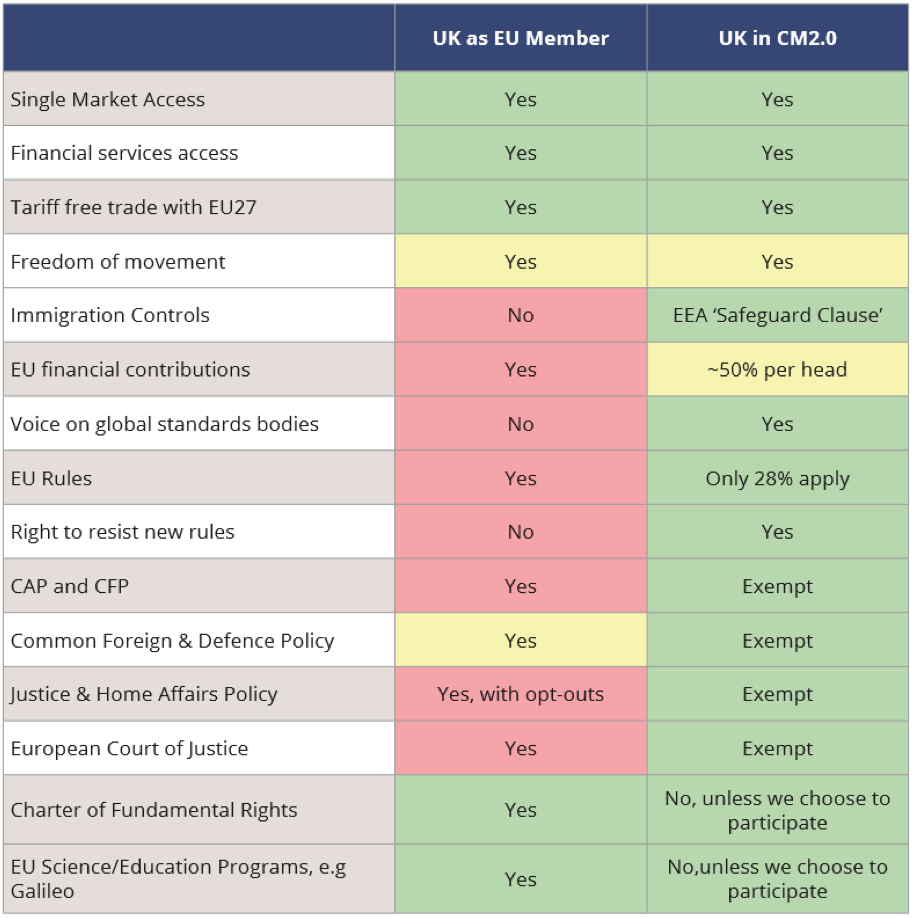One of the major issues with the “Common Market 2.0” marketing document (also referred to as the “Norway option”) is that it does not protect the Common Agricultural or Common Fisheries policies. In fact the opposite is true – the extract below shows the authors see this as a positive.

Common Agricultural Policy effects
It has been well established that UK farmers can only make a profit through EU funding received through CAP. Without it, UK farmers would make an average loss of £9,000 per year. Common Market 2.0 does not suggest any way of making up for this shortfall and consequently 460,000 jobs could be at risk as a result of leaving CAP. However, the problems don’t stop there. The UK’s agriculture industry, like every other agriculture industry around the world, is highly seasonal. You simply can’t grow and harvest certain produce all year round. Meaning that goods must be imported from other parts of the world to maintain the retail supply line into supermarkets. Leaving the EU would mean losing tariff-free access to Spanish oranges and Italian tomatoes. It would also result in tariffs on products like coffee from non-EU countries that we currently trade with through the EU’s “Everything But Arms” agreement. This would lead to goods costing more for UK importers, and that cost would be passed on in price rises for customers. In addition, the effect of leaving the EU and limiting free movement is already impacting the supply of seasonal workers to UK farms, leaving productive crops rotting in the fields. But fish are OK, right? As anyone who has seen Finding Nemo knows, fish inconveniently don’t stay in one place – as a result, UK trawlers have to follow them as they migrate through the year. This takes them into areas designated for the Common Fisheries Policy (as seen below). The loss of these areas will be a big blow to struggling fishing communities – many of whom have been convinced it’s in their best interests when nothing could be further from the truth.

Above: Areas where Scottish vessels caught fish & shellfish in 2013. Below: British fishing waters post-Brexit (in blue)

This leads to half of Scottish fish stocks being lost as the UK cannot enter those territorial waters without violating international law. 45% of the fish caught in the UK are sold to the EU. Most of these species don’t sell well in the UK, so if the market to the EU is lost this will further hurt local fishermen. It is likely the cost of commonly eaten species in the UK would have to rise to compensate fishermen for this loss in business.
The Lack Of Support
It’s no great secret that DEFRA have been expecting at least 25% of the farming industry to fold. Once gone, this includes the assets the farms own, such as land, machinery and livestock going to waste. Farmers with a surplus of livestock such as cattle would be forced to slaughter them if they could not be sold to the EU market.
While DEFRA is planning compensation, this will not cover the loss of revenue and will leave farmers making a loss. Common Market 2.0 would leave farming in a state of collapse and the following questions unanswered:
- What happens to the staff and farm owners?
- What support is there for them to retrain?
- What jobs will they move into?
Conclusion
Common Market 2.0 fails on detail, and also fails to address the real issues surrounding membership of the EU. The Common Market position doesn’t redress the balance and given the lengths of time involved and the high potential to fail to join EFTA and EFTA’s agreements, together with a sufficiently comprehensive Customs Union, UK farmers will be irreparably damaged by this loss. Common Market 2.0 would result in the loss of workers from other EU countries (why would they choose to a country that is unwelcoming towards immigrants?), and doesn’t provide sufficient details for those in businesses across the country. Despite endorsement from Labour MPs, Common Market 2.0 isn’t sufficiently different from May’s deal to protect UK jobs and industries. This fails Labour’s pledge to deliver a (fictional) “jobs first Brexit,” and reinforces that the best deal is the one we already have. The only way to protect our farmers and fishermen is to remain in the EU.
